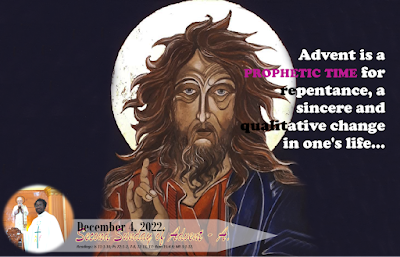Wisdom and Discernment
September 8 2019: Twenty-third Sunday in Ordinary Time - C
An Italian proverb says, “Even a fool is thought wise if he
keeps silent, and discerning if he holds his tongue.”
Every decision one takes in life has its cost. Any choice
has a counter-part. So it is, with choosing to follow the Lord. It costs the readiness
to carry the cross, no matter how heavy that could be.
Mankind is known to be a senseful creature; that is, one who
makes use of his senses, full of reasonable sense; sound; and judicious. Sadly,
oftentimes, some people show to make less use of their senses, mostly of their capacity
of reasoning. Many people in some situations, seem to act before reflecting. Others
speak first, and then ask later to understand what was it about. Many are those
who act before trying to reflect or question on modalities… The process of
questioning or reflecting before action is called discernment.
In the field of priesthood and formation to religious life,
one of the most used word, and one could say the master word is discernment. Discernment
stands as a virtue. It talks of the capacity or ability to judge well and take
the right decision at the right moment. Discernment, nevertheless, does not
apply only in the universe of vocation to religious life and priesthood. In everything
one does and every action one puts, and for every decision, there is a need of
discernment. No one actually, can make a right choice or take a right decision
if he does not cultivate that quality, that is about, seating down and reflecting
before acting.
To be Christian calls for a right discernment. It is not
easy to follow Christ. And we could add, it has even never been easy to do
anything right without some sacrifices. To be a disciple of Jesus is a decision
that involves one’s whole life. It therefore asks for a mature reasoning and
reflection.
Today’s liturgy highlights the reality of discernment. The first
reading, the extract of the Book of Wisdom starts with questions: “Who can know
God’s counsel, or who can conceive what the LORD intends?” As to says, ‘who can
discern the will of God?’ As human beings, we are limited, short in our reasonings
and unable to make right decisions by ourselves. We therefore need divine
counsel and the assistance of the Spirit of God to decide wisely what to do and
what to not do. Thus, the wise man adds, “scarce do we guess the things on
earth, and what is within our grasp we find with difficulty…” This is a sign
that we are actually limited in our judgement. And so, because limited, it
takes us a great sacrifice to understand the way of the Lord and follow him.
The Gospel will intensify on this matter of sacrifice. We are
told of how hard it is for a man to follow the Lord. It asks for breaking with,
cutting, separating… Thus, the strong and tough words of Jesus in this extract
of St. Luke, “If anyone comes to me without hating his father and mother, wife
and children, brothers and sisters, and even his own life, he cannot be my disciple.
Whoever does not carry his own cross and come after me cannot be my disciple.”
To be truly Christian calls for great sacrifices. To follow
the Lord, one must discern well and chose to place him above all things, even
before and above our loved ones; parents, wife, children. It also asks for readiness
to face trials and crosses. Discipleship of the Lord is actually very
demanding. To get a certitude of these words, one could ask his priests and the
consecrated people how much it cost them to follow Jesus. However, when we make
the right discernment and take the right decision, it is rewarding and brings
great happiness. While, he who does not discern, that is, to reflect before
deciding, becomes subject of mockeries and insults. Thus, the second part of
the Gospel, the example of the unfinished building and of the unsuccessful war.
The need of discernment applies to any choice of life. Many
people, without a mature discernment got married. Their life at the end became
worse than hell. Some others entered seminaries and convents, they became
unhappy and gloomy, or problematic religious and priests. There is always a need
to reflect before anything. As the Lord says, to start something and find
oneself unable to go through it is shameful.
For having been a seminary formator for some years, I do always
have this image of young people who enter seminaries and at the end are unable
for many reasons, to carry on their formation. Except some cases with great excuses,
it looks so discreditable. So too, it is, to chose to belong to the Lord and
live in a way that does not correspond to his message.
We are all challenged, as Christians, to be right and worthy
imitators of Christ and thus, until the end. What you cannot end, do not start.
And someone rightly said, “Discerning and acting on God's will does not mean
you'll never have difficult days or feel lousy sometimes. But choosing to live
in alignment with God makes you more joyful, compassionate, and peaceful, even
on bad days.” Crosses lead to glory when carried wisely, and right discernment opens
to wisdom and peace.




Comments
Post a Comment